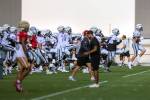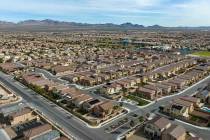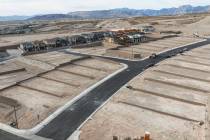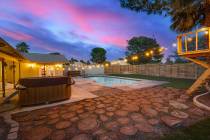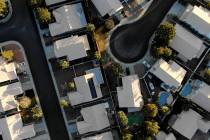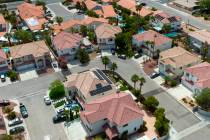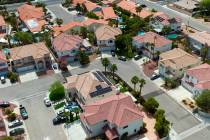Nevada leads nation in foreclosures




Gloom persists in Nevada’s housing market.
The state ranks first in residential foreclosures started and second in delinquencies for the second quarter of 2010.
The Mortgage Bankers Association on Thursday reported that 2.9 percent of Nevada home mortgages went into foreclosure during the second quarter, a decline of 0.3 of a percentage point from the first quarter but still the highest in the country.
The delinquency rate declined 0.8 of a percentage point to 13.2 percent, according to the trade group. Only Mississippi registered a higher delinquency rate, according to the association.
The percentage of Nevada home mortgages in foreclosure remained about the same at 10.3 percent.
While Silver State delinquencies and new foreclosures dipped from the first quarter, one analyst saw little reason for optimism and another suggested the housing market might turn around in three years.
“The Las Vegas housing market is pretty close to a bottom,” said Stephen Brown, the economist who takes over Wednesday as director of the Center for Business and Economic Research at the University of Nevada, Las Vegas.
He expects residential real estate to begin recovering in about three years.
When the recovery comes, Brown said, he doesn’t expect residential housing prices to return to the levels before the bubble burst in 2007, when the median home price was hovering near $300,000.
Brown said the housing sector in Southern Nevada won’t improve until the national economy recovers and reawakens the Las Vegas tourism industry.
The national economy is coming back “very slowly,” the economist said.
A national economic recovery also will help retirees’ investments and may lead retirees to start migrating to Southern Nevada in big numbers again, he said.
Nationally, the foreclosure news is not much better.
Foreclosure listing service RealtyTrac Inc. reported that more than 2.3 million homes have been repossessed by lenders since the recession began in December 2007. And 6 million more will be lost to foreclosure over the next three years, by some estimates.
If that happens, home prices will probably sink further, and the economy will suffer. Builders will keep construction to a minimum, and Americans will be less willing to spend because of their lost home values.
“Housing is certainly not going to help the recovery,” said Michelle Meyer, a Bank of America economist. “It threatens to hinder it.”
Meanwhile, banks are dealing with “impaired balance sheets” and have tightened lending standards, Brown said. “Businesses are reluctant to borrow,” he said.
“Financing is really necessary to get capital formation and capital formation is what is needed for economic growth,” Brown said.
Frank Nason, a real estate broker and owner of Residential Resources, took a negative view: “I don’t see how the housing market is going to be improved anytime soon.”
Job growth and new household formations are needed as fuel for housing demand, Nason said.
“Neither one of these is going on right now in Clark County, or the state either,” Nason said.
The real estate broker took no encouragement from the seasonal slide in foreclosures.
Foreclosure numbers are down, because banks are postponing foreclosures, he said, citing reports that some homeowners are in their home 22 months and longer after stopping payments.
Lenders “just kind of kicked the can down the road,” he said. “They just aren’t foreclosing on the properties.”
Residential home closings were expected to fall off in July, because the $8,000 tax credit for first-time homebuyers ended in June. Nason expects closings to fall even farther during August.
Another worry hanging over residential real estate is the large numbers of homeowners who owe more on their mortgages than their houses are worth. CoreLogic, a Santa Ana, Calif., financial information provider, on Thursday reported 73 percent, or 327,000, of Las Vegas’ residential properties with a mortgage had negative equity.
Nevada had the highest concentration of negative equity of any state at 68 percent, followed by Arizona and Florida, according to CoreLogic.
While Nevada’s 11.8 percentage-point decline in negative equity was also the highest during the second quarter, the decline around the country resulted primarily from foreclosures, not price stabilization, according to CoreLogic.
Contact reporter John G. Edwards at jedwards@reviewjournal.com or 702-383-0420. The Associated Press contributed to this report.





